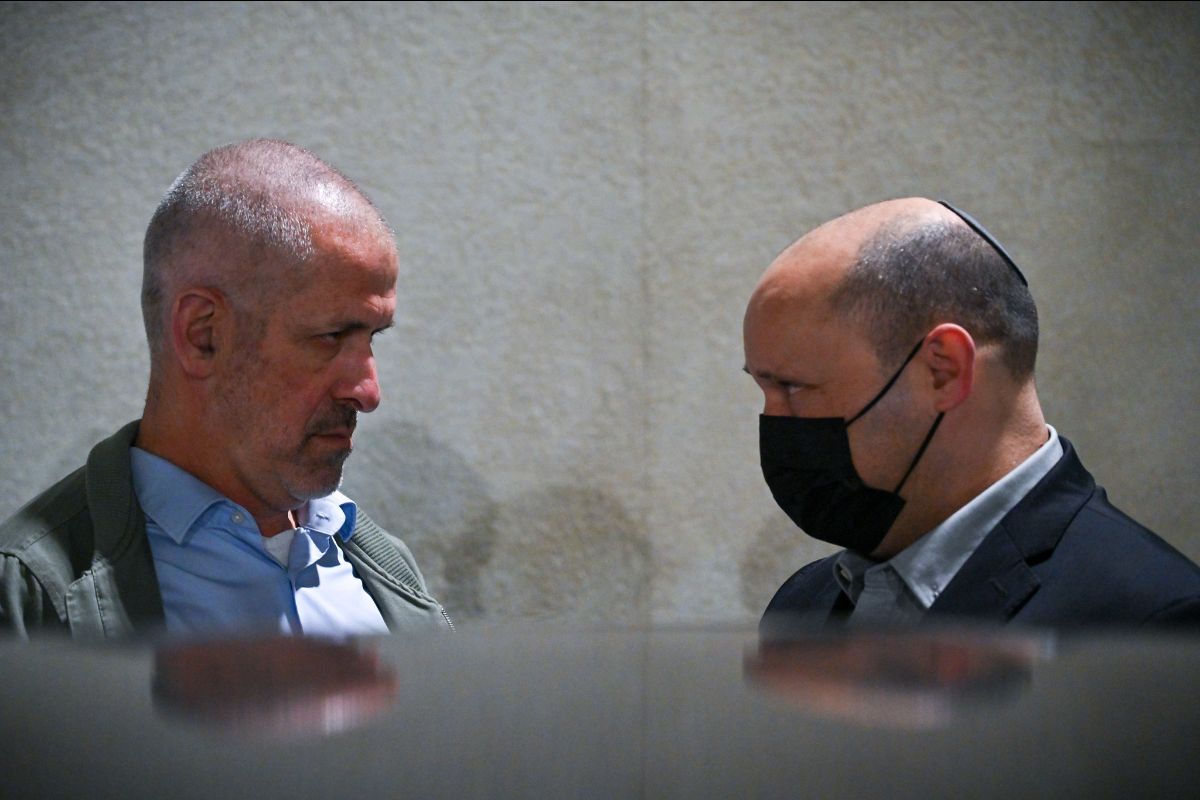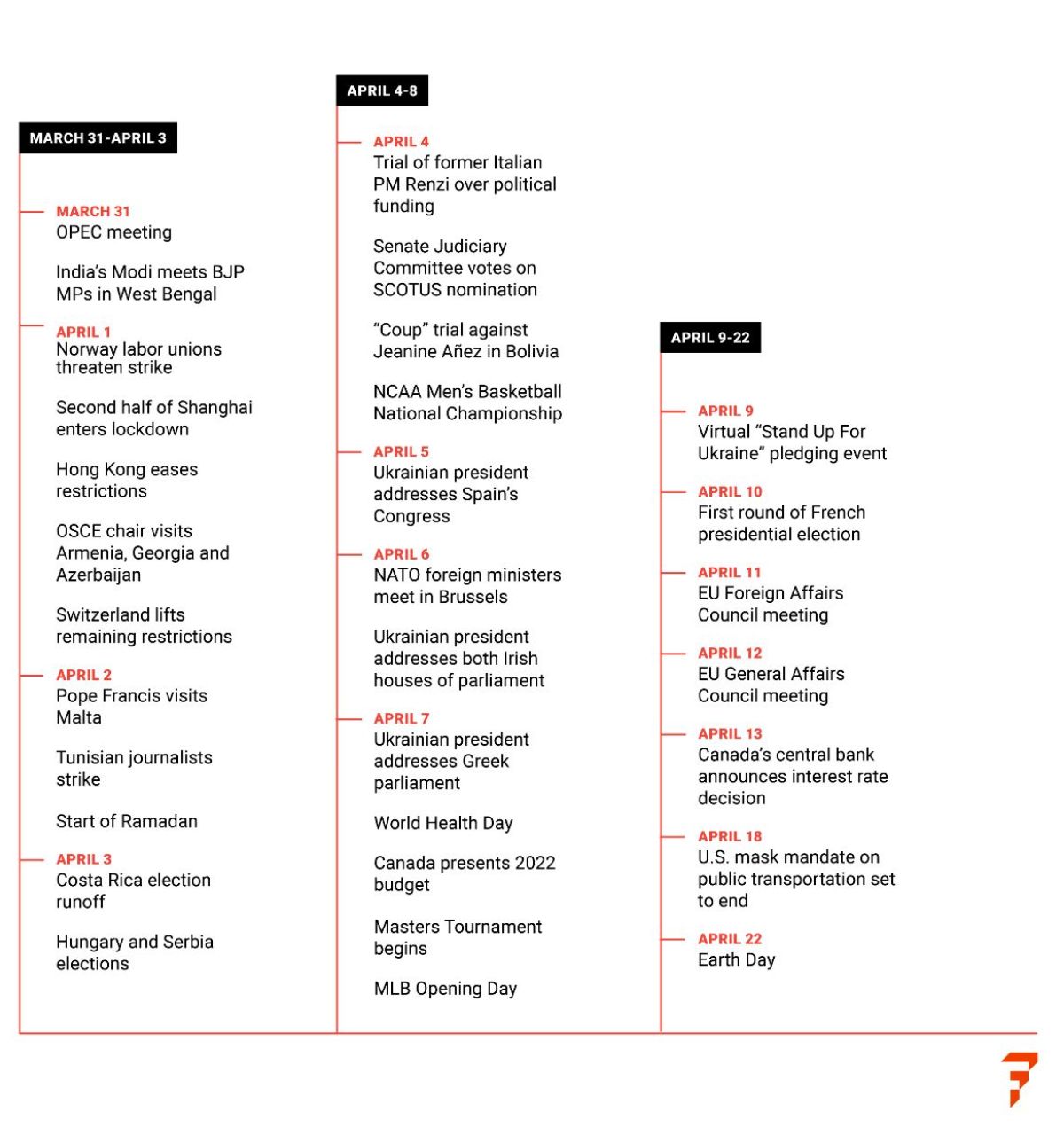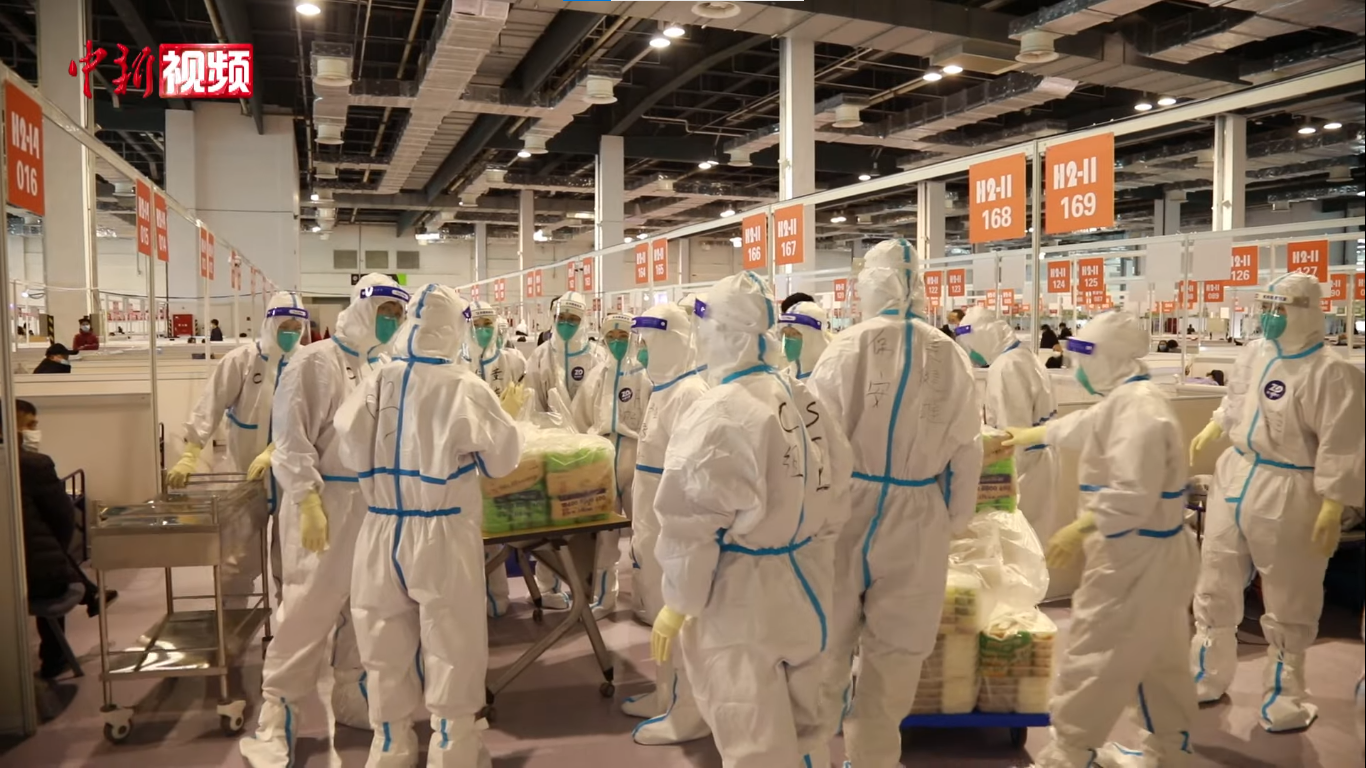Welcome to Factal Forecast, a look at the week’s biggest stories from the editors at Factal. We publish our forward-looking note each Thursday to help you get a jump-start on the week ahead. If this email was forwarded to you, and you like what you see, you can subscribe for free.
As Israel deals with its third deadly attack in a week, fears of copycat violence and claims by the Islamic State have the country on edge. In this week’s Factal Forecast podcast, Senior Editor Jimmy Lovaas and Editor Ahmed Namatalla discuss how the latest attacks differ from past violence in Israel and the varying reactions in the West Bank and Gaza.
Listen now or download on your favorite platform.
A Look Ahead
April 1
Norway labor unions threaten strike
Tens of thousands of workers across Norway’s offshore fabrication and engineering sectors are expected to strike Friday if a deal on wages isn’t reached.
What’s happened so far
Two labor groups of about 28,500 total workers are asking for an average pay raise that exceeds expected inflation, with lower-paid workers seeing the biggest increases. The unions also demand concessions related to gender equality, education for workers and health and safety. Public mediator Mats Ruland is overseeing the compulsory mediation talks, which have entered the final phase of negotiations. The deadline may be extended if there’s progress seen in the discussions.
The impact
The strikes are expected to impact a number of firms in different sectors, which could further hamper global supply chains that rely on uninterrupted supplies of goods. The construction of ships, oil platforms and vehicles may suffer as a result of a prolonged strike. A strike would also overshadow collective bargaining talks expected in the coming weeks for both public and private sector workers.
April 1
Second half of Shanghai enters lockdown
Shanghai’s west side is set to enter lockdown beginning Friday as part of a two-phase movement restriction in mainland China’s most significant financial hub due to a coronavirus case surge. The city’s eastern side was locked down for five days this week, with massive testing underway.
What’s happened so far
Shanghai’s lockdown is China’s biggest coronavirus closure since the shutdown of the city of Wuhan — believed to be the origin of the coronavirus pandemic — two years ago. A record 3,450 asymptomatic cases were reported in Shanghai the day before lockdown commenced, accounting for nearly 70 percent of the nationwide total and reaching China’s highest case tallies since the first weeks of the pandemic in late 2019.
The impact
Under China’s “zero-coronavirus” strategy, cities and one province locked down in recent weeks due to a fresh wave of cases fueled by the omicron variant. But given Shanghai’s role as a global financial and manufacturing hub and major international port, Chinese officials opted for the two-phased approach to minimize disruptions to world trade.
April 1
Hong Kong eases coronavirus restrictions
Hong Kong is scheduled to lift some coronavirus travel measures and gradually resume public services beginning Friday, as cases decline after a record spike several weeks ago.
What’s happened so far
Hong Kong was battered by a fifth wave of coronavirus beginning in mid-February that peaked in early March. The wave brought with it an unusually high death rate that overwhelmed hospitals and triggered compulsory testing across the city. Cases are now dropping rapidly, with local banks, public venues and indoor dining beginning to reopen.
The impact
Hong Kong’s government said its departments will return to normal service by April 21, and schools are due to resume in-person classes by April 19. Travel restrictions are also set to ease, with hotel quarantine time reducing to seven days and transit passengers allowed to pass through Hong Kong.
April 2
Tunisian journalists strike
The National Syndicate of Tunisian Journalists is planning a one-day national general strike for Saturday involving several public media institutions.
What’s happened so far
Press freedom in Tunisia was one of the largest successes of the 2011 Arab Spring, with the country rising 62 spots in the Reporters Without Borders’ press freedom index in just eight years. A recent power grab by President Kais Saied, however, brought new restrictions on press freedom, with several local and international news outlets facing state censorship and police raids. A recent arrest of a Mosaique FM journalist over his refusal to release his sources is the latest in a series arrests targeting media.
The impact
Saturday’s strike shows the growing opposition to the government across Tunisia’s political spectrum. The union hopes to pressure Saied into reversing his decision to bring state television strictly under government control and thereby ban state media from featuring opposition figures, including country’s ousted Islamist Ennahda movement. Protesters in the country, however, have in the past faced arbitrary arrests, including years of lengthy prison sentences.
April 3
Costa Rica election runoff
Costa Rica will hold the second round of this year’s presidential election on Sunday.
What’s happened so far
Costa Rican voters have continued the trend of abstaining from the polls for the third consecutive election amid a proliferation of corruption scandals and economic inequalities in the country. None of the 25 candidates in the presidential race obtained more than 40 percent of the votes necessary to claim victory in the first round on Feb. 6.
The impact
Two candidates are the main contenders in the latest race: conservative-social democrat Rodrigo Chaves of the Partido Progreso Democrático and centrist-left José María Figueres of the Partido Liberación Nacional. According to the latest survey by the University of Costa Rica, the race could end up in a technical draw.
April 3
Hungary elections
Hungarians will vote in the country’s parliamentary elections on Sunday, either securing a fourth term for Prime Minister Viktor Orbán’s populist and national-conservative Fidesz party or voting in the six-party independent United Opposition led by former Mayor Péter Márki-Zay.
What’s happened so far
Polls expect a tight race, with Orbán’s party leading by nearly 7 percent. Both campaigns have had to scrap their rhetoric in light of the Ukraine-Russia conflict and opt for opposing sides, while Orbán’s long-standing political party has used their financial superiority in recent weeks to bolster their campaign.
The impact
This is the first political challenge Orbán has faced in more than a decade and the election will foreshadow Hungary’s position regarding Russia. Orbán, the Kremlin’s strongest EU ally, has campaigned to defer from joining the war, citing his own party as the “pro-peace right.” Financial woes will also crop up after the elections, created by a recent spending spree, immigration and a lack of access to EU’s pandemic recovery funds.
April 3
Serbian elections
Serbians will head to the polls Sunday to choose a president and members of the country’s parliament in what analysts believe will not be a free and fair election.
What’s happened so far
Serbia’s President Aleksandar Vučić announced the elections in what analysts say is an attempt to take advantage of high popularity and consolidate power. The vote is the first such parliamentary race since the 2020 elections that witnessed widespread boycotts from opposition parties against Vučić’s autocratic practices. Vučić stands for reelection, while his Serbian Progressive Party (SNS) coalition seeks to bolster its position.
The impact
The ruling SNS coalition is projected to win the parliamentary polls, despite increasing popularity of opposition parties due to Vučić’s autocratic tendencies and environmental degradation. With Russia’s invasion of Ukraine continuing to grind forward, the war will likely factor in the voting, with Serbia refraining from assigning any blame to Moscow.
April 4
Trial of former Italian PM Renzi
Italy’s former Prime Minister Matteo Renzi will appear in court Monday charged with illegal financing of political parties during his rise to the head of the center-left Democratic Party.
What’s happened so far
Renzi was previously convicted of financial mismanagement – in March 2022, he was fined €69,000 ($77,000) by a Tuscany court for tax damage during his time as mayor of Florence. Friday’s trial relates to €3.5 million ($3.9 million) in donations given to the Open Foundation, which prosecutors say provided illegal financial support for Renzi’s political activities. Further charges of corruption, money laundering and trafficking of influence have been levied against 10 other individuals and four companies.
The impact
A judge will decide Friday whether prosecutors have presented enough evidence to proceed to a full trial. Renzi said the investigation, which began in 2019, has gone on too long and filed a counter-complaint against three of the prosecutors, citing violation of political immunity and abuse of office.
April 4
Senate panel votes on Supreme Court nomination
The U.S. Senate Judiciary Committee will vote Monday on the nomination of Judge Ketanji Brown Jackson to the nation’s highest court, ahead of a possible vote by the full chamber later in the week before its scheduled Easter break.
What’s happened so far
Jackson’s confirmation to fill the seat of retiring Justice Stephen Breyer is all but certain after Sen. Joe Manchin (D-W.Va.) announced last week he would support the nomination and Sen. Susan Collins (R-Maine) announced her support Tuesday. Utah Sen. Mitt Romney is also seen as a likely GOP supporter, though it’s still unclear how he will vote. Meanwhile, Collins and Romney’s conservative colleagues have criticized Jackson over what they say is an expansive view on judicial power and record of being soft on crime.
The impact
While her confirmation wouldn’t change the Supreme Court’s 6-3 conservative majority, Jackson would make history as the first Black woman to sit on the high court. Jackson’s hearings could also foreshadow the GOP’s new line of attack in judicial hearings, as lawmakers continue to push to see nominees’ pre-sentencing reports.
What Else Matters

Israel attacks
Israel is on edge after three deadly attacks, mostly targeting civilians, in the span of a week. In the wake of the violence, Israeli security forces raised their alert level to the highest since the outbreak of fighting with Palestinians almost a year ago. Unlike waves of violence over the past decade, these attacks took place outside of the West Bank and haven’t been directly connected to members of Gaza Strip militant groups that mostly adhere to mutually understood rules of engagement with Israel.
Watch for: At least two of the attacks have been claimed by the Islamic State, a group that has no known presence in Israeli or Palestinian territories and has rarely taken credit for past attacks. That’s prompting a divergence in reaction by Palestinians living in Israel and the West Bank, with multiple leaders condemning the attacks while militant groups in Gaza praise them as a form of resistance to Israeli occupation. Israel’s response has so far been limited to targeted arrests of associates of the assailants and boosting security around the country. The Muslim holy month of Ramadan starts Saturday and has historically witnessed increased tensions between Israelis and Palestinians.
Russia’s shifting war aims
Russia announced last week that it would begin to reprioritize the “main” task of its invasion of Ukraine by focusing efforts on the “complete liberation” of the eastern Donbas region. The announcement was a de-facto admission that its stalled offensive attempting to encircle Kyiv had failed. For weeks, Ukraine and Russia engaged in bloody combat centering around two pushes to Kyiv: one from the northwest and one from the northeast. As the frontlines hardened and casualties from the Russian side mounted with little progress made, the decisive moment of came when Ukraine appeared to launch successful counter offensives against both push axes, culminating in Ukraine’s recapture of the key Irpin suburb. Russia has since announced it would de-escalate its offensives against Kyiv and Chernihiv to further re-prioritize capturing the entirety of the Donetsk and Luhansk regions.
Watch for: The de-escalation is not a ceasefire, as the Russian side made explicitly clear. And while large groupings of Russian forces concentrated on Kyiv were observed repositioning, Moscow is unlikely to unilaterally cede its position and has reportedly begun to dig defensive positions, likely to use these forces as bargaining chips for concessions from Kyiv. Prioritizing the Donbas reflects more limited war aims for Moscow and could signal trouble for Kyiv. Though the besieged city of Mariupol continues to hold out, that may not last long, freeing up Russian forces to renew efforts to further spread west to Mykolaiv. Russian forces pushing south from the largely surrounded city of Izyum could link with the Mariupol units, leaving large swaths of Ukraine’s military isolated in the Donbas region where Russia will attempt to stretch separatist control to the boundaries of Donetsk and Luhansk.
Extended Outlook
What’s on our radar in the coming weeks…

Thanks for reading! to get the Forecast in your inbox sign up for free.
Featured photo: Shanghai’s west side is set to enter lockdown on Friday as part of a two-phase movement restriction in the Chinese city. As part of the lockdown, authorities are implementing a massive testing program. (Photo: China News Network)
What is Factal?
Trusted by many of the world’s largest companies and nearly 300 humanitarian NGOs, Factal is a risk intelligence and collaboration platform that brings clarity to an increasingly noisy and uncertain world.
Powered by a hybrid of advanced AI and experienced journalists, Factal detects early signals, verifies critical details and assesses the potential impact at the speed of social media. From physical incidents and brand mentions to geopolitical developments, Factal offers the most trusted, real-time risk intelligence on the market.
Factal is also home to the largest security and safety collaboration network in the private sector. Members securely share information with other members in proximity to the same incident, both on Factal.com and the Factal app.
Learn more at Factal.com, and we’d love to hear from you.

